When it comes to exploring biochemistry, these are the top five books any science enthusiast should have on their shelf: "Lehninger Principles of Biochemistry" for in-depth and current content, "Biochemistry For Dummies" for simplifying complex topics, "Lippincott Illustrated Reviews: Biochemistry" for detailed illustrations, "Biochemistry (Quick Study Academic)" for quick insights, and "Biochemistry" for engaging information. Each book offers a unique take on this fascinating subject, catering to various learning styles and preferences. Ready to uncover more about these essential biochemistry reads?
Key Takeaways
- "Lehninger Principles of Biochemistry" for comprehensive and updated content.
- "Biochemistry For Dummies" simplifies complex concepts for better understanding.
- "Lippincott Illustrated Reviews: Biochemistry" uses diagrams and illustrations effectively.
- "Biochemistry (Quick Study Academic)" offers a great cheat sheet with diagrams.
- "Biochemistry" book provides engaging content with quality information.
Lehninger Principles of Biochemistry
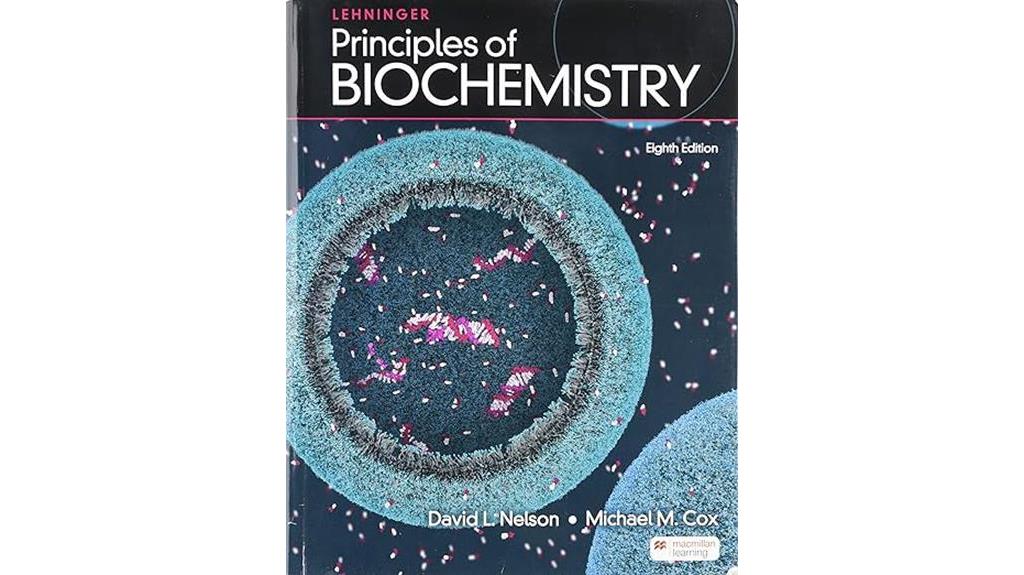
For science enthusiasts seeking a thorough and up-to-date biochemistry textbook, 'Lehninger Principles of Biochemistry' is a highly recommended choice. Readers have praised the book for being exhaustive, well-organized, and updated. Positive reviews highlight falling in love with biochemistry through this book and receiving it in excellent condition.
However, some have expressed dissatisfaction with their purchase, citing issues like receiving a used book instead of a new one, lack of access to homework problems, and cramped margins for notes. Despite these drawbacks, international reviews also commend the book for its quality and usefulness.
Overall, 'Lehninger Principles of Biochemistry' seems to be a solid choice for those delving into the intricacies of biochemistry, offering a detailed and educational resource.
Best For: Students and professionals in the field of biochemistry looking for a comprehensive and updated textbook.
Pros:
- Exhaustive and well-organized content
- Updated information on biochemistry
- Quality of the book is generally good with positive reviews on condition and usefulness
Cons:
- Some buyers may receive used copies instead of new ones
- Issues with access to homework problems reported by some users
- Limited space in margins for taking notes
Biochemistry For Dummies
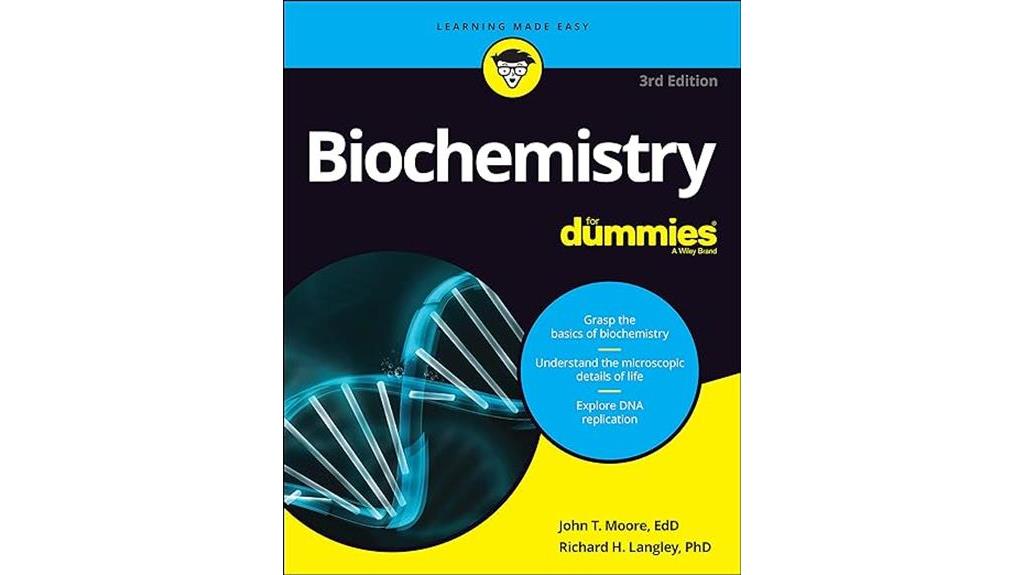
Ideal for individuals seeking a straightforward and accessible introduction to biochemistry, 'Biochemistry For Dummies' simplifies complex concepts and provides a user-friendly approach to the subject matter. This book has received positive reviews for its easy-to-understand explanations, with readers expressing how it helped them grasp difficult concepts and even improve their grades.
Many students have successfully used 'Biochemistry For Dummies' to supplement their university biochemistry courses, preparing for advanced studies in the field. While some readers recommend having a basic understanding of chemistry beforehand, others found it useful despite lacking prior knowledge.
Overall, 'Biochemistry For Dummies' serves as a valuable resource for anyone looking to navigate the intricacies of biochemistry in a clear and digestible manner.
Best For: Individuals seeking a straightforward and accessible introduction to biochemistry.
Pros:
- Easy-to-understand explanations that simplify complex concepts.
- Helpful for improving understanding and grades in biochemistry.
- Useful for supplementing university biochemistry courses and preparing for advanced studies in the field.
Cons:
- Requires a basic understanding of chemistry for optimal comprehension.
- Some readers may need to refer to a basic chemistry book for clarification.
- May pose challenges for those without prior knowledge in chemistry.
Lippincott Illustrated Reviews: Biochemistry
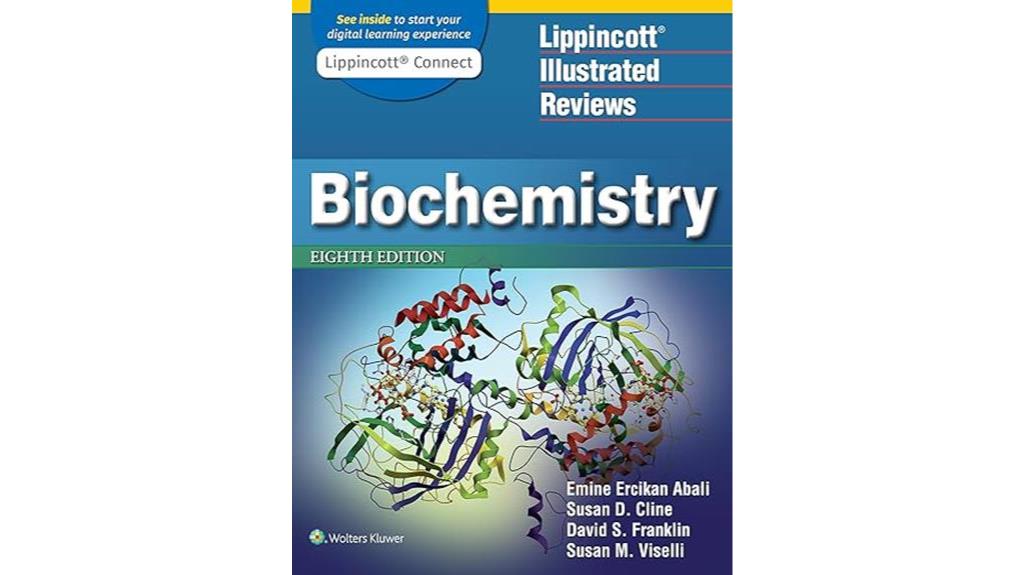
Consider the Lippincott Illustrated Reviews: Biochemistry for science enthusiasts seeking a detailed and visually engaging resource for understanding intricate biochemical concepts. This book makes intricate ideas easier to grasp through its inclusive and easy-to-read content, accompanied by clear diagrams and clinical correlations.
Users appreciate the high-level illustrations and relevant QBanks that aid in reinforcing key information. While the physical book has faced some quality issues like binding problems, the positive feedback on content simplification and clinical relevance outweighs these concerns.
Students and adult learners recommend this book, particularly medical students and those in natural sciences, highlighting its simplified yet informative approach. Despite minor purchase inconveniences like delayed delivery, the book's educational value is highly praised.
Best For: Medical students, natural sciences learners, and individuals seeking a simplified yet comprehensive understanding of biochemistry with clinical relevance.
Pros:
- Simplifies intricate biochemical concepts for easier understanding.
- Includes clear diagrams and high-level illustrations.
- Offers relevant QBanks for effective information reinforcement.
Cons:
- Physical book quality issues such as binding problems.
- Kindle version may have freezing and loading issues.
- Delayed delivery due to direct import may inconvenience some buyers.
Biochemistry (Quick Study Academic)
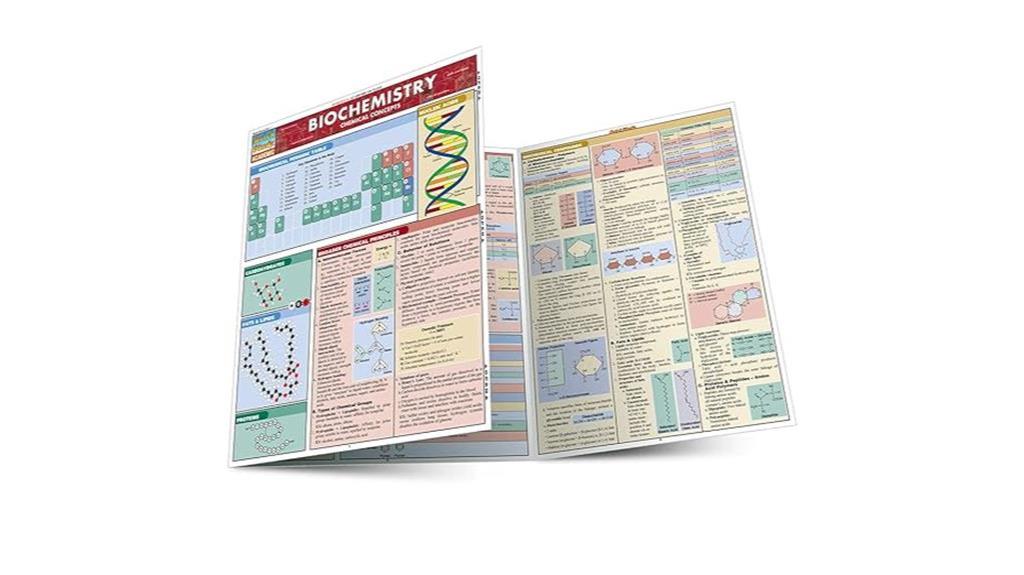
The 'Biochemistry (Quick Study Academic)' guide is a valuable resource for science students seeking a concise and informative study aid. This quick reference tool has garnered positive reviews for its effectiveness as a cheat sheet in biochemistry courses, featuring helpful diagrams and a good summary of information.
It has been noted as particularly useful for Science Fair projects, providing detailed insights that have saved many from confusion in classes. While some reviewers found it lacking in certain aspects like print colors and packaging, overall, it has been recommended as a worthwhile investment.
With advanced information beyond grade level and a convenient plastic coating, this guide proves to be a handy companion for those delving into the intricacies of biochemistry.
Best For: Students in biochemistry courses looking for a concise and informative study aid.
Pros:
- Great cheat sheet for biochemistry courses
- Helpful diagrams
- Detailed insights for Science Fair projects
Cons:
- Disappointing print colors
- Packaging issues like folding upon arrival
- Not required by professors
Biochemistry
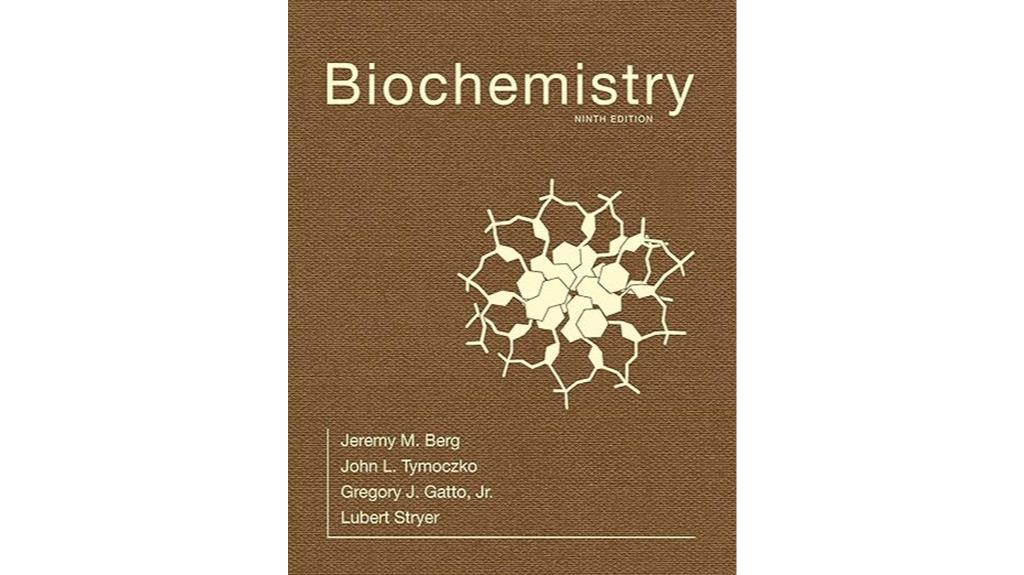
Explore the intriguing world of biochemistry through these recommended books for science enthusiasts. Positive reviews highlight the usefulness of the content, with readers expressing satisfaction with the information provided.
Some users have found the books to be in great condition, meeting their needs for classes and reference. However, there are instances where the condition of the books has been less than ideal, with reports of noticeable damage and discrepancies between the digital and hard copies.
Despite these issues, the overall quality and relevance of the content seem to outweigh any concerns about the condition. If you're excited to investigate the fascinating field of biochemistry, these books come highly recommended for their informative and engaging approach to the subject matter.
Best For: Students and enthusiasts looking for comprehensive and engaging resources to delve into the world of biochemistry.
Pros:
- Informative and engaging content.
- Useful for classes and reference even after completion.
- Positive reviews highlighting the quality of information provided.
Cons:
- Some instances of books arriving in rough condition with noticeable damage.
- Page numbers may not align with hard copies.
- Discrepancies between digital and hard copies, such as continuous scroll not being an option.
Factors to Consider When Choosing Biochemistry
When selecting a biochemistry book, key factors to take into account include the content relevance to your study goals, the ease of understanding the material, and the overall user experience it provides.
Evaluating whether a physical or digital format suits your learning style best is essential, along with looking into any recommended study aids that can enhance comprehension and retention of complex concepts.
Key Selection Criteria
In selecting a biochemistry book, one must carefully assess the level of detail and complexity to guarantee it meets their learning objectives. Understanding your current knowledge level and learning goals is essential in choosing the right book.
Look for resources that offer clear explanations, diagrams, and illustrations to assist in comprehending intricate biochemical concepts effectively. Additionally, consider the availability of supplementary materials such as online resources, practice questions, and study aids to enhance your learning experience and reinforce your understanding.
When evaluating potential biochemistry books, don't overlook the physical quality of the book. Check the binding, paper quality, and overall condition to confirm durability and ease of use throughout your studies.
Lastly, seek recommendations from professors, peers, or experts in the field to identify highly regarded biochemistry books that have proven beneficial for others in their studies. By considering these key selection criteria, you can choose a biochemistry book that aligns with your learning style and helps you achieve your academic goals effectively.
Book Content Evaluation
Taking into account the content of biochemistry books is vital for selecting the most suitable resource to align with your learning objectives and preferences. When evaluating these books, I consider the clarity and depth of the content to confirm it meets my learning goals.
I look for detailed diagrams, illustrations, and clinical correlations that can help me grasp complex concepts more easily. Additionally, the availability of supplementary materials like practice questions or online resources can greatly enhance my learning experience.
User feedback on the physical quality of the book, such as binding issues or page durability, is important, especially if I prefer a print copy. Evaluating the ease of use and accessibility of digital versions, including formats like Kindle or PDF, is also significant to find a suitable option that aligns with my study preferences.
User Experience Consideration
Considering user experience when choosing biochemistry resources involves evaluating factors like physical book quality, digital format importance, and content relevance for best learning outcomes.
The physical quality of a book, including issues like binding durability and page resilience, can have a major impact on user satisfaction.
In the digital domain, importance is key, as users may face frustrations with freezing or loading problems that hinder their access to information. Opting for user-friendly formats such as PDF versions can enhance the overall study experience, especially for note-taking purposes.
Recommendations from other users often emphasize the importance of simplified content, clinical relevance, and high-quality illustrations in selecting biochemistry materials.
Additionally, feedback on the purchasing process, such as delays in delivery or import challenges, can influence the user's decision-making process.
Physical Vs Digital
User experience considerations play a significant role in determining whether to opt for physical or digital biochemistry resources.
Physical biochemistry books offer a traditional reading experience, allowing for tactile feedback and the ease of highlighting and annotating important sections. However, they may be prone to durability issues such as binding problems.
On the other hand, digital biochemistry resources provide the advantage of portability and accessibility across various devices, enabling studying on-the-go. Yet, digital versions can encounter technical glitches like freezing or loading delays, impacting the seamless flow of learning.
The choice between physical and digital formats often comes down to personal preference based on factors like learning style, study habits, and comfort with technology. While some users may enjoy the tangible feel of physical books, others might prefer the convenience and space-saving benefits offered by digital resources.
Ultimately, considering your own preferences and requirements is vital in selecting the most suitable biochemistry resource for your needs.
Recommended Study Aids
When exploring study aids for biochemistry, prioritize selecting resources that align with your preferred learning style and offer clear explanations of complex concepts.
Look for materials that break down intricate biochemistry topics into clear and concise explanations, making it easier for you to grasp the content. Helpful diagrams and illustrations can aid in understanding key biochemical processes, so opt for study aids that incorporate visual elements.
Additionally, consider resources that provide practice questions or quizzes to reinforce your learning and assess your comprehension levels effectively. It's crucial to choose study aids that match your learning preferences, whether you lean towards visual aids, interactive tools, or concise summaries.
Lastly, seek out materials that offer clinical correlations to help you bridge the gap between theoretical knowledge and real-world applications of biochemistry principles. By considering these factors, you can enhance your understanding and retention of biochemistry concepts efficiently.
Frequently Asked Questions
Can I Learn Biochemistry Without a Strong Background in Chemistry?
I can learn biochemistry without a strong chemistry background by focusing on foundational concepts, utilizing resources like online courses and textbooks, seeking help from professors or tutors, and dedicating time to practice problems.
Are There Any Interactive Online Resources to Supplement These Books?
When exploring biochemistry, interactive online resources like simulations and video tutorials can enhance book learning, making complex concepts easier to grasp. It's like having a personal guide alongside you on your educational journey.
How Can I Apply Biochemistry Knowledge in Real-Life Scenarios?
I apply biochemistry knowledge in real-life scenarios by understanding metabolic processes in the body, analyzing DNA sequences for research, and developing pharmaceuticals. Practical applications include personalized medicine, genetic engineering, and environmental biotechnology.
Are There Specific Study Tips for Mastering Biochemistry Concepts?
To truly excel in biochemistry, I find that focusing on understanding core concepts and making connections is key. Regular practice, seeking clarification when needed, and utilizing study groups can also enhance mastery.
Can These Books Help Prepare for Biochemistry Exams Like the MCAT or Gre?
Yes, these books are indispensable for preparing for biochemistry exams like the MCAT or GRE. They provide in-depth knowledge and practical examples that can help master concepts essential for success in these exams.
Conclusion
After exploring the top biochemistry books, I'm excited to delve deeper into this fascinating field.
Did you know that the human body contains about 20,000 genes encoding proteins, each with specific functions essential for our survival?
Imagine the intricate dance of molecules and processes happening inside us every moment.
Biochemistry truly reveals the mysteries of life.
Textbook Of Medical Biochemistry
Author by : MN Chatterjea
Languange Used : en
Release Date : 2011-10
Publisher by : Wife Goes On
ISBN :
Description : The eighth edition of Textbook of Medical Biochemistry provides a concise, comprehensive overview of biochemistry, with a clinical approach to understand disease processes. Beginning with an introduction to cell biology, the book continues with an analysis of biomolecule chemistry, molecular biology and metabolism, as well as chapters on diet and nutrition, biochemistry of cancer and AIDS, and environmental biochemistry. Each chapter includes numerous images, multiple choice and essay-style questions, as well as highlighted text to help students remember the key points....
Biochemistry
Author by : Denise R. Ferrier
Languange Used : en
Release Date : 2014
Publisher by : Lippincott Williams & Wilkins
ISBN :
Description : Lippincott's Illustrated Reviews: Biochemistry is the long-established, first-and-best resource for the essentials of biochemistry. Students rely on this text to help them quickly review, assimilate, and integrate large amounts of complex information. Form more than two decades, faculty and students have praised LIR Biochemistry's matchless illustrations that make critical concepts come to life....
Textbook Of Biochemistry For Medical Students
Author by : D M Vasudevan
Languange Used : en
Release Date : 2013-08-31
Publisher by : JP Medical Ltd
ISBN :
Description : The seventh edition of this book is a comprehensive guide to biochemistry for medical students. Divided into six sections, the book examines in depth topics relating to chemical basics of life, metabolism, clinical and applied biochemistry, nutrition, molecular biology and hormones. New chapters have been added to this edition and each chapter includes clinical case studies to help students understand clinical relevance. A 274-page free booklet of revision exercises (9789350906378), providing essay questions, short notes, viva voce and multiple choice questions is included to help students in their exam preparation. Free online access to additional clinical cases, key concepts and an image bank is also provided. Key points Fully updated, new edition providing students with comprehensive guide to biochemistry Includes a free booklet of revision exercises and free online access Highly illustrated with nearly 1500 figures, images, tables and illustrations Previous edition published in 2010...
Stories Of The Invisible
Author by : Philip Ball
Languange Used : en
Release Date : 2001
Publisher by : Oxford University Press, USA
ISBN :
Description : What are things made of? 'Everything is composed of small mollycules of itself, and they are flying around in concentric circles and arcs and segments,' explains Sergeant Fottrell in Flann O'Brien's The Dalkey Archive. Philip Ball shows that the world of the molecule is indeed a dynamic place.Using the chemistry of life as a springboard, he provides a new perspective on modern chemical science as a whole. Living cells are full of molecules in motion, communication, cooperation, and competition. Molecular scientists are now starting to capture the same dynamism in synthetic molecularsystems, promising to reinvent chemistry as the central creative science of the new century....
Biochemistry
Author by : Donald Voet
Languange Used : en
Release Date : 2004-03-09
Publisher by : John Wiley & Sons
ISBN :
Description : CD-ROM includes computer animated interactive exercizes, guided explorations, and color images....
Food Biochemistry And Food Processing
Author by : Y. H. Hui
Languange Used : en
Release Date : 2008-02-15
Publisher by : John Wiley & Sons
ISBN :
Description : The biochemistry of food is the foundation on which the research and development advances in food biotechnology are built. In Food Biochemistry and Food Processing, lead editor Y.H. Hui has assembled over fifty acclaimed academicians and industry professionals to create this indispensable reference and text on food biochemistry and the ever-increasing development in the biotechnology of food processing. While biochemistry may be covered in a chapter or two in standard reference books on the chemistry, enzymes, or fermentation of food, and may be addressed in greater depth by commodity-specific texts (e.g., the biotechnology of meat, seafood, or cereal), books on the general coverage of food biochemistry are not so common. Food Biochemistry and Food Processing effectively fills this void. Beginning with sections on the essential principles of food biochemistry, enzymology and food processing, the book then takes the reader on commodity-by-commodity discussions of biochemistry of raw materials and product processing. Later sections address the biochemistry and processing aspects of food fermentation, microbiology, and food safety. As an invaluable reference tool or as a state-of-the-industry text, Food Biochemistry and Food Processing fully develops and explains the biochemical aspects of food processing for scientist and student alike....
Biochemistry Of Signal Transduction And Regulation
Author by : Gerhard Krauss
Languange Used : de
Release Date : 2006-03-06
Publisher by : John Wiley & Sons
ISBN :
Description : This all-new edition of a classic text has been thoroughly revised to keep pace with the rapid progress in signal transduction research. With didactic skill and clarity the author relates the observed biological phenomena to the underlying biochemical processes. Directed to advanced students, teachers, and researchers in biochemistry and molecular biology, this book describes the molecular basis of signal transduction, regulated gene expression, the cell cycle, tumorigenesis and apoptosis. "Provides a comprehensive account of cell signaling and signal transduction and, where possible, explains these processes at the molecular level" (Angewandte Chemie) "The clear and didactic presentation makes it a textbook very useful for students and researchers not familiar with all aspects of cell regulation." (Biochemistry) "This book is actually two books: Regulation and Signal Transduction." (Drug Research)...